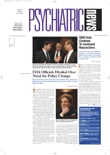States may not be receiving the rebates on drugs for Medicaid patients to which they are entitled, possibly resulting in untold losses to state coffers. In other cases, it is possible that states have been overpaid, according to a report by the federal General Accountability Office (GAO).
The report, released in February, found inadequate oversight of the way manufacturers determine drug prices under a 1990 statute requiring drug companies to provide rebates to states purchasing drugs for patients in the Medicaid program.
Rebates are based on calculations of the “best price” and the“ average manufacturer price” (AMP) reported by drug companies. The GAO report, however, identified a number of factors limiting the government's ability to verify the accuracy of reported drug prices, including a lack of clear guidance on how the AMP should be calculated.
The GAO cited four reports from the Office of the Inspector General of the Department of Health and Human Services that found problems with the way some manufacturer prices were determined.
“However, CMS has not followed up with manufacturers to make sure that the identified problems with prices and methods have been resolved,” stated the GAO report.
The GAO cited considerable variation in the way AMPs are determined and noted that “some methods could have reduced the rebates state Medicaid programs received.”
In other cases, however, it is possible that rebates were overcalculated.“ States could have to repay any excess rebates if manufacturers revise their assumptions and request recalculations of prior rebates,” according to the GAO.
The report also pointed out that the determination of AMP requires consideration of financial arrangements that are made between drug companies and other entities—for instance, manufacturer payments negotiated by pharmacy benefit managers (PBM) on behalf of employer-sponsored health plans and other health insurers.
“CMS's guidance to manufacturers has not clearly stated how manufacturers should treat these payments in their determinations of best price and AMP,” the GAO reported. “Within the current structure of the rebate formula, additional guidance on how to account for these payments to PBMs could affect the rebates paid to states, although whether rebates would increase or decrease as a result, and by how much, is uncertain.”
The report recommended that CMS issue updated guidance on methods of price determination, implement systematic oversight of methods used by manufacturers, and plan to ensure the accuracy of reported prices and rebates to states.
In a letter in response to the GAO report, the CMS agreed in whole or in part to several of the GAO findings, but disagreed with the finding that manufacturer-reported prices are not consistent with rebate program criteria.
“CMS applies systematic edits to data received from manufacturers and seeks correction of data that fail these edits,” the CMS writes in its response. “As a growing number of manufacturers have proposed to modify their methodologies for calculating the AMP and [best price] in recent years, CMS has increased the number of manufacturers referred to the OIG for potential on-site reviews. We also published a regulation to impose a three-year time limitation for manufacturers to recalculate and report data to CMS... and to establish a 10-year record-keeping requirement for manufacturers to retain pricing records under the Medicaid drug rebate program.”
The GAO report, “Medicaid Drug Rebate Program: Inadequate Oversight Raises Concerns About Rebates Paid to States (GAO-05-102),” is posted online at<www.gao.gov/new.items/d05102.pdf>.▪
